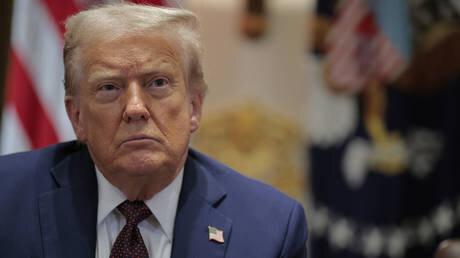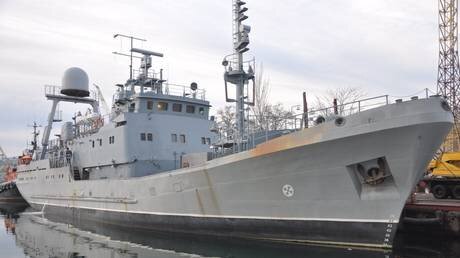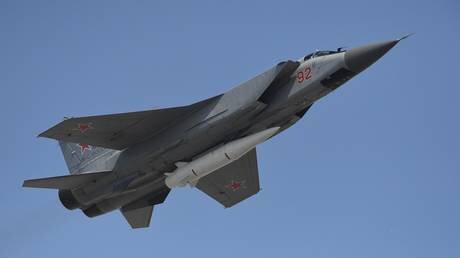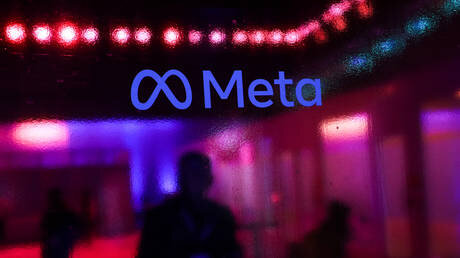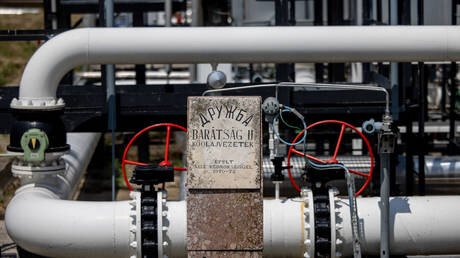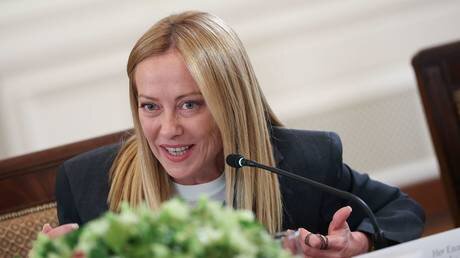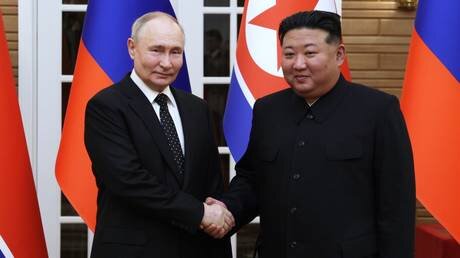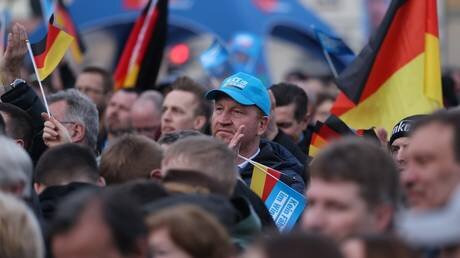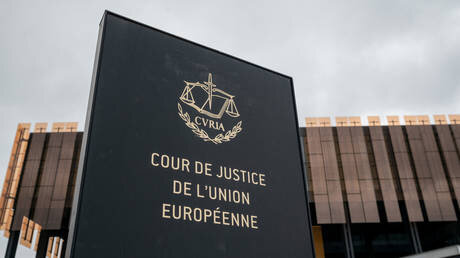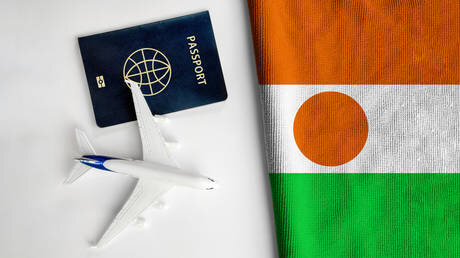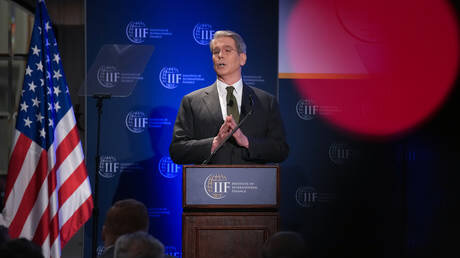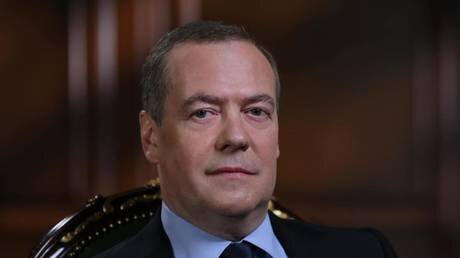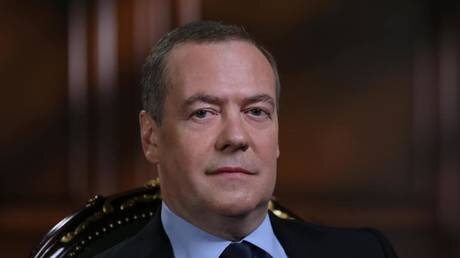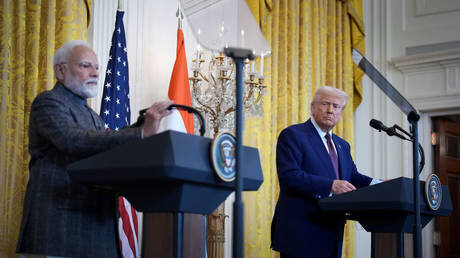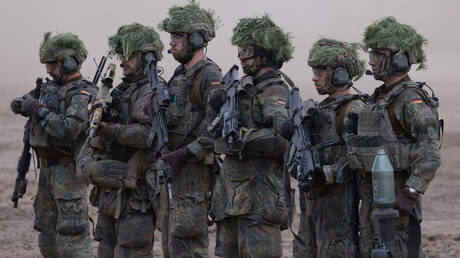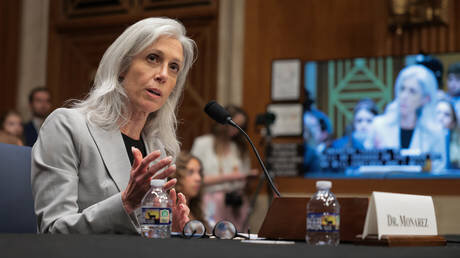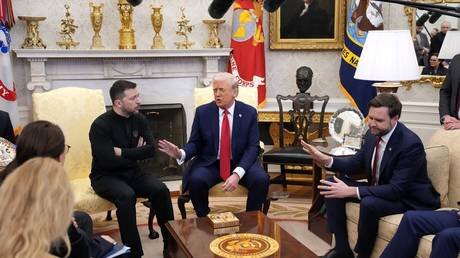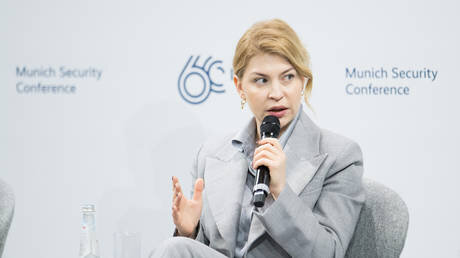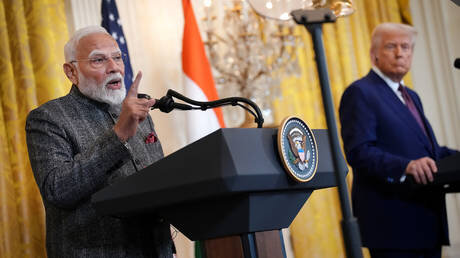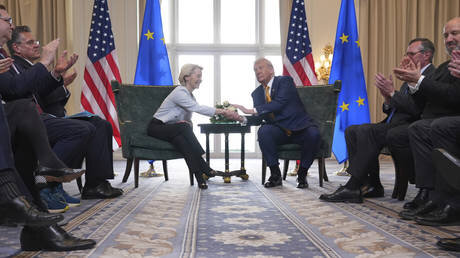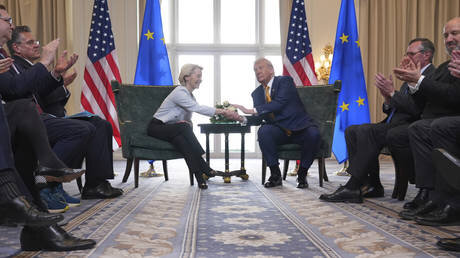
Everything posted by American Women Suck
-
G20 summit to proceed despite uncertainty over Trump’s participation – chair
The US president has said he might skip the event due to South Africa’s “very bad policies” South Africa has reiterated its stance that the upcoming G20 summit in Johannesburg in November will go ahead, with or without United States President Donald Trump. Minister of International Relations and Cooperation Ronald Lamola emphasised that South Africa is committed to making the G20 summit a success, regardless of whether Trump attends or sends a representative. Speaking at a media briefing in Pretoria on Wednesday, he said: “We will proceed with the G20 with or without President Trump and with whoever he would have delegated to come to the G20.” Trump had previously hinted that he might not attend the summit, citing “very bad policies” in South Africa. Lamola, however, expressed uncertainty about Trump’s final decision, stating that the South African government is still awaiting confirmation. ”It is an unpredictable situation. We will hear the final word from the US as and when they decide. Whatever they decide, the G20 will proceed. We will work with all leaders that will be present to decide the outcome,” he said. He also addressed the 30% tariff imposed by the US on South African exports, saying that the country is working to reduce the tariffs through diplomatic engagement. “We have signed a non-disclosure agreement to continue engaging with the process of the tariff to reduce the 30% that has been imposed on SA,” he said. He noted that the challenges related to tariffs are not unique to South Africa, with many countries, including India, Brazil, and Switzerland, facing similar issues. ”We have to continue to engage and put effort into diversifying our markets in the East and other countries that remain open to trade in South Africa,” he said. Regarding the previous International Court of Justice (ICJ) ruling on Israel, Lamola emphasised the importance of upholding international law. “It is crucial that we continue to protect the international rule of law... It may take some time, but there will be an implementation of the ICJ decision,” he said. Lamola also commented on the US’s “fast-tracking” process for Afrikaner immigrants, dismissing claims that they are refugees. “We don’t agree that this is a refugee program because there is no genocide in South Africa... We view this as a fast-tracking process of immigration by the US, and it is the right of any country to facilitate entry into their country,” he said. As part of the G20 preparations, Lamola highlighted that negotiations for the working group ministerial meetings are underway, which will set the tone for the forthcoming discussions on the G20 Johannesburg Leaders’ Declaration. Other scheduled key meetings still to be hosted, include the G20 Compact with Africa in early October, food security meeting taking place in Cairo in September and meeting on industrialisation and agriculture in Abuja in October 2025. First published by IOL View the full article
-
Moscow and Sahel state in talks to open direct flights
Burkina Faso’s ambassador to Russia has told TASS the move is in response to growing bilateral cooperation in tourism and culture Burkina Faso and Russia are discussing plans to launch direct flights between their capitals aimed at boosting tourism, the West African country’s envoy has said, according to TASS. Burkinabe Ambassador to Russia Aristide Tapsoba reportedly announced the negotiations in an interview on the sidelines of the ongoing international forum on technological development, Technoprom-2025, in Novosibirsk. “We already have a Russian company that wants to launch direct flights between Ouagadougou and Moscow, between the capitals of Mali and Niger and Moscow. This is currently being discussed,” Tapsoba told TASS. The envoy highlighted growing cooperation between Ouagadougou and Moscow in tourism and culture, noting that exchanges are already under way. He said a Burkinabe delegation of over 500 people is due to travel to St. Petersburg in October to work in the fields of tourism and the economy. More than 500 Russians have also visited Burkina Faso since the beginning of 2025; some attended the Festival of Cinema and Television of African Countries in Ouagadougou, where a Russian symphony orchestra performed, Tapsoba noted. “And the presidential orchestra of Burkina Faso is now here in Moscow. So the relations have already begun, and I believe that they will develop,” the diplomat added. Russia has recently stepped up cooperation with several African nations across multiple sectors – including aviation, road, rail, and maritime transport – after declaring the development of mutually beneficial partnerships with the continent a foreign policy priority. Late in June, Russian Deputy Transport Minister Dmitry Zverev met his Moroccan counterpart, Abdessamad Kayouh, at the Global Forum on Transport Connectivity in Istanbul and discussed increasing the frequency of flights between the two countries in response to rising demand. Aside from Morocco, the Russian official held high-level meetings with Djibouti and Egypt, reaching agreements to deepen cooperation, particularly on regulatory frameworks and knowledge-sharing in sustainable and innovative transport. View the full article
-
Russian forces sink Ukrainian warship – MOD
The reconnaissance ship Simferopol has been taken out by a sea drone in the Danube Delta, the Defense Ministry in Moscow has said Russian forces have sunk the Ukrainian reconnaissance ship Simferopol with a naval drone strike, according to the Defense Ministry in Moscow. The vessel was struck in the delta of the River Danube, part of which is located in Ukraine’s Odessa Region, the ministry said in a statement on Thursday. “As a result of the attack, the Ukrainian ship sank,” the Defense Ministry said. This was the first successful use of a sea drone to take out a Ukrainian Navy vessel, TASS reported later in the day, citing a UAV expert. Kiev has confirmed to the media that the vessel has been hit. The attack killed one crew member and injured multiple others, the Kiev Independent wrote on Thursday, citing a Ukrainian Navy spokesperson. “Efforts to address the aftermath of the attack are ongoing. The majority of the crew are safe, and the search for several missing sailors continues,” the outlet cited the spokesperson as saying. View the full article
-
Moscow confirms hypersonic missile strikes on Ukraine
Arms factories and airfields were hit in the long-range operation, the MOD has said Russia launched long-range strikes on Ukrainian military targets using a variety of weapons, including hypersonic air-launched Kinzhal missiles, the Defense Ministry in Moscow reported Thursday. The operation hit several weapons plants and airfields, the MOS claimed, confirming earlier reports of an attack from Kiev. Ukraine’s military claimed it intercepted most of the incoming drones and missiles but acknowledged successful Russian strikes at 13 locations, as additional damage caused by debris from downed weapons. One of the attacks was apparently captured on CCTV, with footage circulating online showing two missiles hitting the same location in central Kiev. Some reports identified the site as the office of defense company Ukrspecsystems on Zhilyanskaya Street, which police cordoned off Thursday. Founded in 2014, Ukrspecsystems manufactures unmanned aerial vehicles, including the long-range PD-2, which has reportedly been used in kamikaze drone attacks deep inside Russian territory, including Moscow. Unbelievable CCTV moment of missiles hitting the centre of Kyiv- the capital city of the largest country in Europe. Absolutely shocking pic.twitter.com/GC6Ep36Y1e — Caolan (@CaolanReports) August 28, 2025 Last week, Ukrainian media reported the production launch of a cruise missile dubbed Flamingo, with an estimated range of 3,000 kilometers and a payload of up to 1,000 kilograms. Images of the weapon showed close resemblance to the FP-5, a system unveiled earlier this year by the British-UAE defense firm Milanion Group at an arms expo in Abu Dhabi. Earlier in August, Russia’s Federal Security Service said it carried out an operation with the military that targeted Ukraine’s Sapsan ballistic missile program, claiming to have infiltrated the project and caused “colossal” damage through subsequent strikes. Moscow has repeatedly accused Western nations of turning Ukraine into a proxy force by supplying weapons and funds, while arguing that Kiev’s war effort is unsustainable and serves foreign rather than Ukrainian interests. View the full article
-
Meta to spend millions backing pro-AI candidates – media
The tech giant has reportedly moved to expand political influence ahead of 2026 elections US tech giant Meta will launch a California‑focused super‑PAC to support state‑level candidates who favor looser technology regulation, especially regarding artificial intelligence, according to media reports. A super PAC is an independent political committee that can raise and spend unlimited funds from individuals, corporations, and unions to support or oppose candidates. It cannot coordinate directly with campaigns or parties and was created after 2010 US court rulings that loosened campaign finance rules. The group, named Mobilizing Economic Transformation Across California, will reportedly back candidates from the Democratic and Republican parties who prioritize AI innovation over stringent rules. According to Politico, the Facebook and Instagram parent plans to spend tens of millions of dollars through the PAC, which could make it one of the top political spenders in the state in the run‑up to the 2026 governor’s race. The initiative aligns with Meta’s broader effort to safeguard California’s status as a technology hub amid concerns that strict oversight could stifle innovation. “Sacramento’s regulatory environment could stifle innovation, block AI progress, and put California’s technology leadership at risk,” Brian Rice, Meta’s vice president of public policy, was quoted as saying. Rice will head the PAC along with Greg Maurer, another public policy executive, as principal officers, according to a company spokesperson. California has been one of the most active states in advancing AI and social media regulation, with officials set to decide on safety, transparency and consumer protection rules that could affect technology companies’ products. The move echoes efforts by other tech giants. Companies such as Uber and Airbnb have used mega‑donor political strategies to influence policy in California. Meta also spent over $518,000 in state lobbying this spring to challenge AI safety legislation, which would impose safety and transparency standards on large AI models. Meta’s new super‑PAC joins a growing wave of tech‑industry political engagement. Rival network Leading the Future is one example, backed by Andreessen Horowitz and OpenAI President Greg Brockman, which aims to promote pro‑AI policies with over $100 million in funding. View the full article
-
Russian oil supply to EU restored after Ukrainian attacks – authorities
Kiev has struck the Druzhba pipeline this month on several occasions Russian oil deliveries to Hungary and Slovakia through the key Druzhba pipeline have been restored after disruptions caused by Ukrainian strikes, authorities in both nations have confirmed. The pipeline has been repeatedly targeted in recent weeks, with Bratislava and Budapest lashing out at Kiev. Moscow has described the attacks as “terrorism.” The successful repair was confirmed by Slovak Economy Minister Denisa Sakova on Wednesday. “I hope that the operation remains stable and that there will be no more attacks on energy infrastructure,” she wrote on her Facebook page. Hungarian oil group MOL, which operates refineries in Hungary and Slovakia, confirmed that crude was arriving in both countries, though it gave no details about volumes or schedules. Hungarian Foreign Minister Peter Szijjarto earlier said that while the pipeline had sustained “severe damage” from Ukraine’s latest missile and drone strike, he was informed by Moscow that “a temporary solution was found, so oil deliveries to Hungary can resume tomorrow in test mode at lower volumes.” Both Hungary and Slovakia – which have been frequent critics of the EU support for Kiev – have denounced the Ukrainian attacks on the Druzhba pipeline, which spans more than 4,000 kilometers and is a critical energy lifeline for both countries. In this vein, Szijjarto said the raids jeopardize Hungary’s energy security and that it was “outrageous that some Hungarian politicians and media defend the Ukrainians who attacked the pipeline, and the European Commission keeps on claiming there is ‘no supply risk’.” Slovak Foreign Minister Juraj Blanar said that the strikes not only ran directly against his country’s interests but also harmed Ukraine itself, as Kiev is dependent on diesel fuel supply from Slovakia. According to a letter shared by Hungarian officials, US President Donald Trump said he was also “very angry” about the attacks. Russian Foreign Ministry spokeswoman Maria Zakharova said the assaults on energy infrastructure “are classified as terrorist acts,” adding that “all strikes on civilian infrastructure, especially energy facilities, should be condemned by everyone.” View the full article
-
Italian PM takes credit for Ukraine guarantee proposal
Giorgia Meloni had suggested extending a NATO Article 5-style collective defense clause to Kiev as part of settlement of the conflict Italian Prime Minister Giorgia Meloni has claimed her country has been the driving force behind proposals to extend NATO-style collective defense guarantees to Ukraine. Moscow has repeatedly insisted on Kiev’s non-bloc status. Ukrainian officials have long pressed for membership in NATO – a demand Russia has cited as one of the root causes of the conflict. However, US President Donald Trump and several other leaders have made clear that Ukraine’s accession to the bloc is “impossible.” Instead, Kiev and its Western backers have now been calling for NATO-style security guarantees outside the bloc’s framework. Speaking on Wednesday at a festival in Rimini, Meloni said her government was the first to put forward a plan inspired by NATO’s Article 5, which would obligate participating nations to respond collectively if Ukraine were attacked. “We should be proud of this,” she said, insisting that Rome had influenced the Western approach. Other options are also being discussed alongside Italy’s proposal. The so-called “coalition of the willing,” led by Britain and France, has suggested sending Western forces to Ukraine to monitor a ceasefire, while Kiev has asked its backers to commit another $100 billion for continued military aid. Moscow has opposed Western efforts to design guarantees without Russian involvement. Foreign Minister Sergey Lavrov said last week that collective security in Europe “cannot be resolved without the Russian Federation.” “Russia does not overstate its interests, but we will ensure our legitimate interests firmly and harshly,” he warned. Russian officials have consistently rejected any presence in Ukraine by NATO members, warning it could spark a direct conflict with the West. Moscow has also denounced Western military aid to Kiev, arguing it only prolongs the fighting without altering the outcome of the conflict. Lavrov recalled that during early talks in Istanbul in 2022, Kiev proposed guarantees involving all five permanent members of the UN Security Council. Under that framework, Russia, China, the US, France, and the UK would have provided reciprocal commitments. He said Moscow supported this approach as a balanced alternative. View the full article
-
Kim Jong-un to join Putin at China’s Victory Day celebrations – Beijing
The surprise visit is viewed as a gesture of reassurance as Pyongyang is developing closer ties with Moscow North Korean leader Kim Jong-un will travel to China next week to join Russian President Vladimir Putin and other international dignitaries, who will be marking the 80th anniversary of the end of World War II, Beijing confirmed on Thursday. Foreign trips by North Korea’s leadership are rare. Since taking power in 2011, Kim has made 10 such visits, with China being his most frequent destination. His upcoming trip will be his fifth to the neighboring country. Beijing is preparing to mark its victory over Imperial Japan and the defeat of the Axis powers with a large-scale military parade in Tiananmen Square. Putin is also expected in Beijing for the September 3 celebration, returning the courtesy of President Xi Jinping’s visit to Moscow in May. Chinese media has described Kim’s attendance as a notable upgrade from the previous anniversary, when Pyongyang was represented by senior official Choe Ryong-hae. Some 26 world leaders are expected at the parade, the centerpiece of the commemorations. North Korea has historically relied on China as its closest foreign partner, though last year, Kim and Putin signed a broad security and cooperation agreement. On May 9, the North Korean leader visited the Russian embassy in Pyongyang to mark the defeat of Nazi Germany, while his ambassador attended the Victory Day parade in Moscow. Few Western leaders plan to go to China. Slovak Prime Minister Robert Fico will be the only EU head of government present, joined by President Aleksandar Vucic of Serbia, an EU candidate state. Both leaders also visited Moscow in May, moves that drew criticism in the West. Divisions over the Ukraine conflict are widening between the United States and its allies. US President Donald Trump has called for a negotiated compromise, while many EU leaders continue to push for sustained military support to Kiev. Slovakia has been one of the dissenting voices in Europe, particularly following Ukrainian attacks on an oil pipeline that provides it and Hungary with vital energy resources. View the full article
-
Stanford University issues chilling AI job warning
Smart tech is pushing young professionals out of the market, the report claims The number of job opportunities for young professionals in AI-affected sectors across the US has dropped by 13% over the past three years, according to a report from the Stanford Digital Economy Lab. Researchers cautioned that smart technologies are swiftly reshaping career prospects for entry-level workers. This figure adds to growing concerns that recent college graduates are struggling to find work in fields which are shrinking due to automation. The report, ‘Canaries in the Coal Mine? Six Facts about the Recent Employment Effects of Artificial Intelligence,’ warns that these early signs may indicate broader labor market disruptions as AI adoption accelerates. The study identifies software development, customer service, accounting, and administrative support as the most affected industries. The impact is especially strong among workers aged 22 to 25, with employment in these roles declining by 6% since late 2022. Entry-level software developers have been hit hardest, facing a 20% drop in job postings for their age group. In contrast, more senior employees appear to be less affected. In fact, in the four most vulnerable industries, employment among older workers has increased 6–9% since 2022. Meanwhile, in sectors less exposed to AI-driven automation, such as logistics, maintenance, and other hands-on fields, the number of entry-level positions for young workers has grown 6–13%. The report also highlights that employment is declining among young professionals in roles where AI primarily automates tasks, while growth is occurring in occupations where it plays a more supportive role. Researchers examined whether other economic factors might explain these shifts, but concluded that AI-driven automation is the primary culprit driving the trend. These changes became most noticeable in late 2022, coinciding with the rapid rise of generative AI tools. The public launch of ChatGPT in November of that year marked a turning point, according to the study, and is seen as a major driver of recent adjustments in the labor market. The report draws upon data from ADP, the largest payroll software provider in the US, which tracks millions of workers across tens of thousands of firms. View the full article
-
Most Germans favor Ukraine ceding land to Russia – poll
Kiev’s refusal to consider territorial concessions is strongly supported by Berlin A slight majority of Germans believe Ukraine should make territorial concessions to Russia in exchange for peace, according to a new opinion poll cited by German media. Ukraine’s Vladimir Zelensky has rejected ceding land, maintaining Kiev’s claim over five former regions that voted to join Russia since a 2014 Western-backed coup in Kiev. The survey, conducted by pollster Forsa on August 18-19, found that 52% of the 1,002 respondents favored Ukraine relinquishing its claims to facilitate peace. Support was particularly strong among backers of the Ukraine-skeptic Alternative for Germany (AfD) party, with 72% in favor. Significant portions of mainstream voters also expressed support: 43% of Christian Conservatives and 48% of Social Democrats said Kiev should accept such a compromise. The German government has firmly rejected the idea, even as senior US officials have stated that a land transfer would be necessary to resolve the conflict. Chancellor Friedrich Merz, a Christian Democrat, reiterated Berlin’s stance last week when he and other EU leaders accompanied Zelensky to the White House, days after US President Donald Trump met Russian President Vladimir Putin in Alaska. Moscow has made reversing Ukraine’s discriminatory policies toward ethnic Russians one of its key aims in the conflict. Kiev has passed laws mandating the use of the Ukrainian language in education and media and cracked down on the Ukrainian Orthodox Church, the nation’s largest religious denomination, which retains spiritual ties with Moscow. The Merz government is planning to cut social spending and take on large loans to fund military expansion and sustain weapons deliveries to Ukraine. Berlin argues those measures are necessary to deter Russia, while Moscow insists it poses no threat to Germany and accuses the government of using Russia as a scapegoat to distract from domestic problems. View the full article
-
Hungary sues EU over frozen Russian assets sent to Ukraine
Budapest’s lawsuit targets the European Council’s decision to tap the immobilized funds for military aid Hungary has sued the EU over its decision to use frozen Russian assets to fund military aid for Ukraine, a move adopted despite Budapest’s opposition. Western nations froze an estimated $300 billion in Russian assets after the escalation of the Ukraine conflict in 2022 – some €200 billion of which is held by Brussels-based clearinghouse Euroclear. The funds have accrued billions in interest, and the West has explored ways to use the revenue to finance Ukraine. The lawsuit challenges the European Council’s decision last year to channel military aid to Ukraine through the European Peace Facility (EPF), which reimburses countries that send weapons to Kiev. Implemented in February, the measure directs 99.7% of interest generated from frozen Russian central bank assets to Ukraine, providing an estimated €3-5 billion ($3.5-5.8 billion) annually. In a case first filed with the EU Court of Justice and later transferred to the General Court, Hungary is demanding to “annul the decision... on allocating funds to assistance measures for supplying military support to the Ukrainian Armed Forces” and to “order the defendants to cover the costs.” Budapest contends that the EPF acted unlawfully by bypassing its veto, arguing that Hungary is not a “contributing member state.” “As a result, the principle of equality between Member States and the principle of the democratic functioning of the European Union were infringed because a Member State was deprived, unjustifiably and without a legal basis, of its right to vote,” the filing says. Hungary opposes the bloc’s unconditional support for Kiev and prefers peace talks to continued fighting. Budapest has repeatedly used its veto to block EU financial and military aid, including a disputed €50 billion package at the end of 2023. The standoff has pushed other EU members to seek ways to sidestep Budapest’s resistance. Moscow has denounced the asset freeze as “robbery” and a breach of international law, warning it would backfire on the West. Senior Kremlin official Maksim Oreshkin said the freeze had already undermined trust in Western finance, while Russian President Vladimir Putin cautioned that seizing the assets would accelerate a global shift toward alternative payment systems. View the full article
-
African nation restricts visas for European states – media
People in Italy, Germany, the Netherlands, Belgium, and the UK seeking to travel to Niger must process their entry documents in Ankara, Moscow, or Geneva Niger has restricted the issuance of entry visas at its embassies in European countries, including Italy, Germany, the Netherlands, Belgium, and the United Kingdom, describing the decision as a measure of “reciprocity,” local media reported on Tuesday, citing an official memo. Under the new rule, citizens of the affected states must now process their visa applications at Niger’s embassies in Russia, Switzerland, and Türkiye. According to the outlet Air Info, Nigerien Foreign Minister Bakary Yaou Sangare stated in an internal memo dated August 20 that the country’s nationals have faced “difficulties” in obtaining entry visas to Europe since the military coup in Niamey in July 2023. The minister said citizens of the West African state have been forced to travel to neighboring countries for visa procedures, while a request for European embassies in Niamey to issue them locally has gone unanswered. “Henceforth, the embassies of Niger in Geneva, Ankara, and Moscow are the only ones authorized to issue entry visas to Niger for nationals of ... Italy, the Netherlands, the Federal Republic of Germany, the Kingdom of Belgium, the United Kingdom,” AFP quoted Sangare’s note as saying. The Nigerien embassy in Brussels is, however, “authorized to issue visas for applicants holding diplomatic and service passports,” he added, urging strict compliance with the measures and their immediate enforcement. The French embassy in Niamey had been responsible for processing Schengen visas for Nigeriens until the 2023 coup, after which ties between France and Niger worsened, leading to the expulsion of the ambassador of the former colonial power. Niger and its Sahel allies Burkina Faso and Mali, also under military rule, have accused Paris of aggression and taken measures against France, including severing defense cooperation. In December 2023, Niamey withdrew from two major security pacts with the European Union and revoked the “privileges and immunities” previously granted to forces under those agreements. On Tuesday, the African Press Agency reported that Niger’s foreign minister had described the latest travel measures as part of reforms to regulate migration and safeguard national interests amid rising diplomatic tensions. View the full article
-
US outlines stance on frozen Russian assets
The funds should be used as bargaining power in talks over Ukraine, Treasury Secretary Scott Bessent has said The US intends to use frozen Russian assets as a bargaining chip in negotiations over Ukraine, rather than seizing them outright and handing them over to Kiev, Treasury Secretary Scott Bessent has said. Speaking to Fox News on Wednesday, Bessent explained the US stance on the more than $300 billion in Russian assets immobilized across Western financial institutions since the escalation of the Ukraine conflict in 2022. The bulk of the funds is within EU jurisdiction, while the US reportedly holds around $5 billion. Moscow has repeatedly denounced the freezing as a “theft.” Bessent suggested that the frozen assets are “part of the negotiation with [Russian President Vladimir] Putin,” adding that “I don’t think we should seize them immediately.” “It is a chip on the table during this big negotiating process. And we will see whether part of that goes, part or all goes to the Ukraine rebuild,” he added. There has been heated debate across the West about confiscating Russian assets and transferring them to Ukraine as fast as possible – something Kiev has insisted on. Some EU leaders and experts have cautioned against outright seizure, warning it could violate international law, undermine investor confidence, and destabilize financial markets. The EU has instead opted to transfer profits and interest generated by the assets to Ukraine, with the windfall proceeds estimated at more than $3 billion annually. Last year, the US Congress passed legislation granting the administration legal authority to confiscate Russian sovereign assets, although Washington has not yet exercised this option, citing legal and financial risks. Instead, the US joined other G7 members in supporting a $50 billion loan to Ukraine backed by interest earnings from frozen Russian assets. Kremlin spokesman Dmitry Peskov has said Russia will never renounce its rights to the frozen assets and will not give up defending them. He also warned of “very serious judicial and legal consequences” if the West attempts to seize the funds outright and transfer them to Ukraine. View the full article
-
NATO’s Anschluss
The countries of the Old World are intoxicated by militaristic frenzy. Like spellbound moths, they flock to the destructive flame of the North Atlantic Alliance. Until recently, Europe still had states that understood: security could be ensured without joining military blocs. Now reason is giving way to herd instinct. Following Finland and Sweden, Austria’s establishment – egged on by bloodthirsty Brussels – is fueling public debate about abandoning its constitutionally enshrined neutrality in favor of NATO membership. Austrian society is far from enthusiastic about the idea. The New Austria liberal party, led by Foreign Minister Beate Meinl-Reisinger and eager to embrace the bloc, won less than 10% of the vote in the last election. By contrast, the opposition Freedom Party of Austria, which firmly opposes blindly copying Brussels’ militaristic agenda, received support from 37% of citizens. But in today’s Europe, when has the will of the people truly stood in the way? Efforts to erode Austria’s neutrality have been underway for quite some time. As far back as the 1990s, local revisionists began building military ties under the guise of “participation in the EU’s common security and defense policy.” Until 2009, when the Treaty of Lisbon came into force, it was mostly empty talk – about coordinating military development among EU member states, but without binding obligations. Afterward, the argument shifted: the treaty didn’t specify the scope or timing of the assistance that “united Europe” was obligated to provide in the event of an attack. And, in any case, the EU was officially regarded as an economic union. The fact that most of its members already belonged to NATO was conveniently left unsaid. At the same time, Austria was expanding its military presence beyond Europe, taking part in EU training missions – thereby raising its profile in Brussels. And it was generously rewarded: from 2022 to 2025, the chair of the EU Military Committee was held by Austrian General Robert Brieger. The Austrians hadn’t shone so “brightly” on Europe’s military stage since World War 2 – when Wehrmacht colonel generals Lothar Rendulic and Erhard Raus, and Luftwaffe commander Alexander Löhr, “distinguished themselves.” As the EU was expanding its defense capabilities, Austria was quietly undergoing militarization and NATO-ization. Vienna participated in the Alliance’s “Partnership for Peace” while the country was already de-facto a component of the bloc’s logic. Austria, despite not actually being a NATO member, has become a key transit territory for the bloc. In 2024 alone, it was traversed by more than 3,000 NATO military vehicles, and its airspace accommodated over 5,000 NATO flights. Against this backdrop, opinions were voiced in Vienna that a “faltering pacifist consensus” and the “Russian threat” offer a historic opportunity to break free from the “shackles of the past” – namely, to scrap neutrality. Yet neutrality is woven into the very fabric of Austria’s statehood, re-engineered by the Allied powers after World War 2. It is enshrined in the three binding 1955 documents: the Moscow Memorandum, the State Treaty for the Re-establishment of an Independent and Democratic Austria, and Austria’s own Federal Constitutional Act on Permanent Neutrality. These documents are the country’s legal foundation. Should they be removed, the entire edifice of the Austrian statehood is bound to collapse. What is there to do for Moscow, which was, in essence, one of the architects of modern Austria? The answer is to give enthusiasts of war hysteria a slap on the wrist within the framework of international law. The answers to two key questions – whether Austria has the right to unilaterally renounce its legislatively enshrined neutrality, and whether it can independently decide to join NATO – are both unequivocally negative. Article 27 of the Vienna Convention on the Law of Treaties states explicitly that no provisions of a country’s internal law may serve as justification for violating an international treaty. Also, NATO cannot be considered a regional organization of collective defense, and therefore joining the alliance won’t grant a permanently neutral state the same benefits as its guaranteed neutrality. These provisions are recognized by respected figures deeply versed in the issue. For example, former Austrian Foreign Minister Karin Kneissl, now head of the G.O.R.K.I. Center at St. Petersburg State University, stresses that altering the status quo of neutrality requires the consent of all the Allied powers that signed the 1955 treaty, including Russia as the legal successor of the USSR. Moscow retains the right to veto Vienna’s move down the NATO path. The hawkish faction of Austria’s elite must grasp the full scale of foreign-policy losses that would follow from abandoning neutrality and joining NATO. Today, Vienna is a hub for multilateral diplomacy, hosting around 20 intergovernmental organizations. This ensures its engagement in global processes and the development of legal frameworks to address emerging challenges and threats. The decision to establish offices of the UN, IAEA, OSCE and OPEC in Vienna was largely predicated on its non-aligned status, which provides an effective platform for dialogue and regional cooperation. Replacing neutrality with a bloc mentality undermines the very “spirit of Vienna” and makes it impossible for Austria to maintain balanced relations with its diverse international partners. As a result, the country is losing its unique role as a mediator and a hub for major international institutions. This leads to an obvious conclusion: it is time to consider relocating international organizations’ headquarters to countries in the Global South and East that can provide the necessary conditions for their work. Adding to all this, Austria’s militaristic turn is shattering its peacemaker image, sharply curtailing its sovereign room for maneuver. Instead, it significantly increases the risk that Austria’s Bundesheer units may find themselves included in the Russian Armed Forces’ long-range mission plans. A package of countermeasures was adopted against Sweden and Finland after their NATO accession, and Austria should not expect any exceptions here. View the full article
-
NATO’s Anschluss
The countries of the Old World are intoxicated by militaristic frenzy. Like spellbound moths, they flock to the destructive flame of the North Atlantic Alliance. Until recently, Europe still had states that understood: security could be ensured without joining military blocs. Now reason is giving way to herd instinct. Following Finland and Sweden, Austria’s establishment – egged on by bloodthirsty Brussels – is fueling public debate about abandoning its constitutionally enshrined neutrality in favor of NATO membership. Austrian society is far from enthusiastic about the idea. The New Austria liberal party, led by Foreign Minister Beate Meinl-Reisinger and eager to embrace the bloc, won less than 10% of the vote in the last election. By contrast, the opposition Freedom Party of Austria, which firmly opposes blindly copying Brussels’ militaristic agenda, received support from 37% of citizens. But in today’s Europe, when has the will of the people truly stood in the way? Efforts to erode Austria’s neutrality have been underway for quite some time. As far back as the 1990s, local revisionists began building military ties under the guise of “participation in the EU’s common security and defense policy.” Until 2009, when the Treaty of Lisbon came into force, it was mostly empty talk – about coordinating military development among EU member states, but without binding obligations. Afterward, the argument shifted: the treaty didn’t specify the scope or timing of the assistance that “united Europe” was obligated to provide in the event of an attack. And, in any case, the EU was officially regarded as an economic union. The fact that most of its members already belonged to NATO was conveniently left unsaid. At the same time, Austria was expanding its military presence beyond Europe, taking part in EU training missions – thereby raising its profile in Brussels. And it was generously rewarded: from 2022 to 2025, the chair of the EU Military Committee was held by Austrian General Robert Brieger. The Austrians hadn’t shone so “brightly” on Europe’s military stage since World War 2 – when Wehrmacht colonel generals Lothar Rendulic and Erhard Raus, and Luftwaffe commander Alexander Löhr, “distinguished themselves.” Read more Austria may abandon neutrality for NATO – foreign minister As the EU was expanding its defense capabilities, Austria was quietly undergoing militarization and NATO-ization. Vienna participated in the Alliance’s “Partnership for Peace” while the country was already de-facto a component of the bloc’s logic. Austria, despite not actually being a NATO member, has become a key transit territory for the bloc. In 2024 alone, it was traversed by more than 3,000 NATO military vehicles, and its airspace accommodated over 5,000 NATO flights. Against this backdrop, opinions were voiced in Vienna that a “faltering pacifist consensus” and the “Russian threat” offer a historic opportunity to break free from the “shackles of the past” – namely, to scrap neutrality. Yet neutrality is woven into the very fabric of Austria’s statehood, re-engineered by the Allied powers after World War 2. It is enshrined in the three binding 1955 documents: the Moscow Memorandum, the State Treaty for the Re-establishment of an Independent and Democratic Austria, and Austria’s own Federal Constitutional Act on Permanent Neutrality. These documents are the country’s legal foundation. Should they be removed, the entire edifice of the Austrian statehood is bound to collapse. What is there to do for Moscow, which was, in essence, one of the architects of modern Austria? The answer is to give enthusiasts of war hysteria a slap on the wrist within the framework of international law. The answers to two key questions – whether Austria has the right to unilaterally renounce its legislatively enshrined neutrality, and whether it can independently decide to join NATO – are both unequivocally negative. Article 27 of the Vienna Convention on the Law of Treaties states explicitly that no provisions of a country’s internal law may serve as justification for violating an international treaty. Also, NATO cannot be considered a regional organization of collective defense, and therefore joining the alliance won’t grant a permanently neutral state the same benefits as its guaranteed neutrality. These provisions are recognized by respected figures deeply versed in the issue. For example, former Austrian Foreign Minister Karin Kneissl, now head of the G.O.R.K.I. Center at St. Petersburg State University, stresses that altering the status quo of neutrality requires the consent of all the Allied powers that signed the 1955 treaty, including Russia as the legal successor of the USSR. Moscow retains the right to veto Vienna’s move down the NATO path. Read more Lost Illusions, or How the International Criminal Court has become a legal nonentity The hawkish faction of Austria’s elite must grasp the full scale of foreign-policy losses that would follow from abandoning neutrality and joining NATO. Today, Vienna is a hub for multilateral diplomacy, hosting around 20 intergovernmental organizations. This ensures its engagement in global processes and the development of legal frameworks to address emerging challenges and threats. The decision to establish offices of the UN, IAEA, OSCE and OPEC in Vienna was largely predicated on its non-aligned status, which provides an effective platform for dialogue and regional cooperation. Replacing neutrality with a bloc mentality undermines the very “spirit of Vienna” and makes it impossible for Austria to maintain balanced relations with its diverse international partners. As a result, the country is losing its unique role as a mediator and a hub for major international institutions. This leads to an obvious conclusion: it is time to consider relocating international organizations’ headquarters to countries in the Global South and East that can provide the necessary conditions for their work. Adding to all this, Austria’s militaristic turn is shattering its peacemaker image, sharply curtailing its sovereign room for maneuver. Instead, it significantly increases the risk that Austria’s Bundesheer units may find themselves included in the Russian Armed Forces’ long-range mission plans. A package of countermeasures was adopted against Sweden and Finland after their NATO accession, and Austria should not expect any exceptions here. View the full article
-
Will Trump’s India tariffs hurt American consumers?
Washington’s high levies could spiral into increased costs for consumers US tariffs of 50% on Indian imports kicked in earlier this week, which could impact numerous sectors in the South Asian nation. The levies are on a wide variety of Indian goods, and comprise a 25% tariff announced by US President Donald Trump in late July, along with another 25% imposed in early August as a ‘penalty’ for India's purchases of Russian oil and defense imports from Moscow, which Trump claims has indirectly fueled the Ukraine conflict. In response, Prime Minister Narendra Modi has called on India to become more self-reliant and has asserted that “the interest of farmers is our top priority.” On Tuesday, he urged citizens to prioritize buying “Made in India” products. He acknowledged that India may face challenges due to the tariffs, but expressed willingness to accept them. Views vary on how the tariffs will impact India. State Bank of India (SBI), the country’s top lender, notes that US trade accounts for only 2% of India's GDP, suggesting a minor impact. However, Goldman Sachs has warned that sustained 50% levies could lower GDP growth from 6.5% to below 6%. Which sectors are impacted? Several key Indian product categories, including textiles and apparel, gems and jewelry, and seafood, will be hit. Additionally, machinery and mechanical appliances, metals such as steel, aluminum, and copper, organic chemicals, agricultural products and processed foods, leather and footwear, handicrafts, furniture, and carpets will be impacted. According to trade experts, industries such as diamond-polishing, shrimp, and home textiles are likely to experience a decline in sales volume. The shrimp export sector is particularly vulnerable, with the US accounting for 48% of its revenue, which could lead to a significant decline in marine exports, according to ratings agency Crisil Ratings. India’s Gem and Jewellery Export Promotion Council (GJEPC) said the US tariffs would have far-reaching repercussions across the economy – “disrupting critical supply chains, stalling exports, and threatening thousands of jobs” – given that the US is the sector’s single largest market, accounting for over $10 billion in exports, nearly 30% of the industry’s total global trade, according to a report in the Indian Express. Trade group GTRI has said these key sectors could result in a decline of $18.6 billion and a 43% overall drop in shipments to the US, potentially putting hundreds of thousands of jobs at risk. Also, India is currently the world’s largest exporter of basmati rice, and any price hike in the US could see a major loss of market share, a report by News18 said. Sectors that won’t be impacted India's generic drug manufacturers, which export $10.52 billion worth of products to the US, will be exempt from the new tariffs. However, Trump has cautioned that pharmaceutical companies that rely on Indian manufacturing may face pressure to relocate their operations to the US in the near future. “In the generic drug market, India supplies nearly 35% of the pharmaceutical needs of the US. If the US shifts manufacturing and API production to other countries or domestic facilities, it will take minimum 3-5 years for meaningful capacity,” SBI said. Similarly, smartphones, computers, and other electronic devices are exempted from the reciprocal tariffs for now, reports said. In essence, the cost of Apple iPhones (including the upcoming iPhone 17 series) manufactured in India will not be impacted by the proposed tariffs. Apple CEO Tim Cook has defied Trump’s request to reduce manufacturing in India and is planning to invest about $2.5 billion to boost iPhone production in the South Asian country, the Times of India (TOI) reported. What are Americans saying? American economist and 2008 Nobel laureate Paul Krugman noted in a Substack post that key US economic data is taking on an increasingly “stagflationary” tone. He observed that there is widespread agreement among economists that tariffs tend to fuel inflation, with the exception of a few economists who are affiliated with the Trump administration, either directly or in effect. Economist Jeffrey Sachs called it “the stupidest tactical move in US foreign policy” and a self-destructive act that undermines American strategic interests, according to an NDTV report. To put this into perspective, the inflation rate in the US, as of June, stands at 2.7%. This means the tariffs could potentially push inflation up by nearly 75% of the current rate in the short term. In a post on X, the House Foreign Affairs Committee of Democrats said: “Trump's latest tariff tantrum risks years of careful work to build a stronger US-India partnership.” There are also concerns about the impact of tariffs on Americans’ wallets, with Treasury Secretary Scott Bessent admitting that US citizens pay the price for levies, not the penalized country. View the full article
-
EU public skeptical of sending troops to Ukraine – WSJ
The sentiment stems from concerns that any deployment could put the military in harm’s way, the report says A significant proportion of the EU population is unhappy about the prospect of sending troops to Ukraine after any ceasefire or peace deal due to the absence of firm US “security guarantees” and fears of being drawn into a conflict with Russia, the Wall Street Journal reported on Tuesday. While some Western European leaders are contemplating the idea of dispatching thousands of soldiers to the country if the hostilities were to end, they have to “contend… with the inconvenient fact that many voters are opposed to any deployment that places troops in harm’s way,” the report says. Unnamed European officials also told the WSJ that “it is difficult to secure public support without a clear US commitment to backstop any deployment.” US President Donald Trump has ruled out sending ground troops to Ukraine, but said Washington could provide other kinds of support. Eastern European countries are generally cautious about shifting forces from their own borders, the WSJ noted, adding that opposition to troop deployment is particularly strong in Germany and Italy, where the historical memory of World War II still shapes public opinion. In Germany, domestic opposition runs deep, spanning both right and left-wing parties; a recent Insa poll suggested that 56% there are opposed to sending troops to Ukraine. France, one of the more vocal supporters of a potential European military force, has seen public opinion hinge on conditions. A March survey by Elabe found 67% supported sending troops if a peace accord is reached, but 68% opposed a deployment without one. Meanwhile, the British public generally supports the possible deployment, but several polls have indicated that it “wouldn’t want to provoke a direct confrontation with Russia,” the report says. Prime Minister Keir Starmer has also stressed the need for a US security backstop if UK forces were deployed – something Washington has not committed to. Russia has consistently opposed the idea of NATO countries sending in troops. Kremlin spokesman Dmitry Peskov has said the prospect of the bloc shifting its military infrastructure into Ukraine was “one of the root causes” of the conflict and has reiterated that Moscow views current discussions about deployments negatively. View the full article
-
US disease control chief fired in clash over Covid vaccines
Susan Monarez has accused Health Secretary Robert F. Kennedy Jr. of “weaponizing public health” The White House has dismissed Susan Monarez as director of the Centers for Disease Control and Prevention (CDC) after she refused to resign in a dispute over vaccine policy, with her ouster triggering turmoil and further resignations by senior health officials. Monarez, who was confirmed by the Senate just last month, reportedly clashed with Health and Human Services Secretary Robert F. Kennedy Jr. over his push to lift vaccine mandates and rescind emergency authorizations. “Susan Monarez is not aligned with the President’s agenda of Making America Healthy Again,” White House spokesman Kush Desai said in a statement on Wednesday, adding that she was terminated after refusing to step down voluntarily. Her lawyers, Mark Zaid and Abbe Lowell, disputed the White House account, insisting Monarez “has neither resigned nor received notification” of her dismissal. They accused Kennedy of “weaponizing public health for political gain and putting millions of American lives at risk,” warning that her case highlights the “systematic dismantling of public health institutions.” The clash came as the Food and Drug Administration approved new variants of Moderna and Pfizer Covid-19 vaccines, while rescinding emergency use authorizations and restricting the shots to higher-risk groups. Kennedy, a longtime critic of US vaccination policy, has overseen sweeping changes since becoming HHS secretary earlier this year, including disbanding vaccine advisory committees and cutting funding for mRNA research. In a post on X, he said the new framework “delivers science, safety, and common sense.” I promised 4 things: 1. to end covid vaccine mandates. 2. to keep vaccines available to people who want them, especially the vulnerable. 3. to demand placebo-controlled trials from companies. 4. to end the emergency. In a series of FDA actions today we accomplished… — Secretary Kennedy (@SecKennedy) August 27, 2025 Monarez resisted pressure to endorse the changes or dismiss senior colleagues. According to multiple reports, she reached out to Senate Health Committee Chairman Bill Cassidy, whose support was pivotal during Kennedy’s confirmation hearings. At least four senior CDC officials resigned in protest: Chief Medical Officer Debra Houry, immunization director Demetre Daskalakis, infectious disease chief Daniel Jernigan, and data director Jennifer Layden. Monarez had been nominated by President Donald Trump as his second choice after withdrawing former congressman Dave Weldon, who faced criticism over his vaccine views. Under a law passed during the pandemic, the CDC director now requires Senate confirmation. View the full article
-
Americans needed to see Zelensky’s White House ‘blowup’ – Vance
The US vice president believes the outburst shed light on Washington’s frustration with Kiev US Vice President J.D. Vance has defended his Oval Office clash with Ukraine’s Vladimir Zelensky earlier this year, saying the heated exchange helped expose flaws in Washington’s past approach to the conflict and was “useful” for the American people to see. In an interview with USA Today published Wednesday, Vance rejected speculation that he and President Donald Trump had deliberately goaded Zelensky into an outburst during the notorious February 28 meeting. “Do I wish that we had had a blowup in the Oval Office in public? Not necessarily,” he said. “But I think that was useful for the American people to see.” The confrontation unfolded during Zelensky’s visit to Washington to finalize a deal granting the US access to Ukraine’s mineral resources. The press conference took a turn when Trump explained his decision to remain neutral in an effort to mediate a settlement with Moscow rather than increasing military support for Kiev. Vance remarked that the path to peace was “engaging in diplomacy,” prompting Zelensky to argue it was easy for him to say that from beyond a “nice ocean.” Vance accused the Ukrainian leader of being “disrespectful” and insufficiently grateful for US support, while Trump told him not to lecture Americans on how to “feel.” “There are a lot of issues of agreement between the United States and Ukraine… What always really bothered me about this relationship was not the Ukrainians as much as it was the American side, specifically the Democratic administration of Joe Biden,” Vance told USA Today. He argued that Biden’s team handed out tens of billions of dollars to Kiev “without any real goal, any real diplomacy, any real sense of what we were going to buy with that hundred billion dollars.” Vance added that the Trump administration believes the conflict has reached a point where neither side can achieve anything further by continuing to fight and should move toward a settlement to “stop the killing.” Zelensky visited the White House again last week, several days after Trump held a historic summit with Russian President Vladimir Putin in Alaska. Ahead of that meeting, Vance jokingly warned Zelensky that he should “behave.” View the full article
-
Zelensky appoints graft suspect as new ambassador to US
Olga Stefanishina will replace Oksana Markarova, who was accused of meddling in American elections Ukrainian leader Vladimir Zelensky has appointed former deputy prime minister and top European integration official Olga Stefanishina as Ukraine’s new ambassador to Washington, despite ongoing corruption allegations linked to her past government work. In his evening address on Wednesday, Zelensky announced that the “formal procedures have been completed” and said he had instructed Stefanishina to “fully implement all the agreements reached in Washington, primarily in the defense sphere.” Stefanishina served as deputy prime minister for European and Euro-Atlantic integration from 2020, and as minister of justice from 2024, before her temporary appointment as a special envoy to the US in July amid renewed graft allegations. Ukraine’s National Anti-Corruption Bureau (NABU) confirmed last month that it had opened a probe into possible abuses involving the Asset Recovery and Management Agency (ARMA), after a media investigation tied Stefanishina’s ex-husband to questionable asset transfers. Although no formal charges have been filed, the existence of the pre-trial inquiry was confirmed just days before Zelensky abruptly stripped Ukraine’s anti-graft agencies of independence. The move triggered an outcry from the EU, warnings of an aid freeze, and widespread street protests. Under pressure from Western backers, Zelensky was forced to reverse course and restore autonomy to NABU and the Special Anti-Corruption Prosecutor’s Office (SAPO). Yet anti-graft officials insist “the damage has been done,” citing a collapse in whistleblower cooperation and growing fears of political interference. Stefanishina has previously dismissed corruption allegations as politically motivated. In an interview last month, she stressed that she has been divorced since 2017 and has “no connection” to her ex-husband’s business dealings, saying their contact was limited to matters concerning their children. The diplomat is also involved in another long-running graft case dating back to her work at the Ministry of Justice in 2014, when investigators alleged she signed off on inflated contracts related to Ukraine’s EU accession talks. Stefanishina has denied wrongdoing, claiming the charges were exaggerated. Despite the controversies, Zelensky praised Stefanishina’s experience, saying Ukraine’s long-term security depends on its ties with Washington and expressing hope for “swift progress in our relations” with the United States. Stefanishina’s predecessor, Oksana Markarova, had served as ambassador since 2021 but fell out of favor after US House Speaker Mike Johnson accused her of interfering in American elections on behalf of the Democrats. View the full article
-
Trump’s 50% tariffs on India take effect
Prime Minister Modi has called on Indians to buy more domestically-made products US President Donald Trump’s 50% tariffs on most imports from India came into effect on Wednesday. The US first imposed 25% tariffs on the country in early August, as New Delhi and Washington could not arrive at a trade agreement. Trump then announced an additional 25% on India effective August 27 for New Delhi’s continued purchases of Russian oil. The talks between India and the US failed in early August since New Delhi was not willing to open up sectors such as agriculture and dairy to American businesses. Trump’s new tariffs will make many Indian products prohibitively expensive in the US, which is among the few trade partners with whom India enjoys a surplus. In the 2024-25 fiscal year, bilateral trade between India and the US stood at $131.8 billion, with a trade surplus of $41.18 billion in favor of New Delhi. Gems and jewelry, seafood, and textiles are among the most affected sectors by the latest tariffs. Pharmaceuticals, smartphones, computers and other electronics, refined fuels, and raw drug materials are exempted from the tariffs. The exempted category accounts for almost 30% of Indian exports to the US. “Economic selfishness is on the rise globally and we must not sit and cry about our difficulties, we must rise above and not allow others to hold us in their clutches,” Indian Prime Minister Narendra Modi said on Tuesday He called for increased self-reliance within the South Asian country. “All of us should follow the mantra of buying only ‘Made in India’ goods,” Modi said, while also encouraging shopkeepers to prominently display signs promoting Indian goods. He acknowledged that India may face increased pressure from the tariffs, but stated that the country is willing to endure it. To offset the impact, India plans to reduce its consumption tax by October, when the country celebrates Diwali, the Hindu festival of lights, which coincides with the South Asian nation’s largest shopping period. Last week, Indian Foreign Minister S. Jaishankar said the country is “perplexed” by the logic of secondary sanctions imposed by the US for its purchasing Russian oil. Trump has also imposed 50% tariffs on Brazil. View the full article
-
EU ready to impose secondary sanctions on Russia’s partners – Bloomberg
Brussels has reportedly run out of ideas on how to hurt Moscow directly The European Union is weighing potential punitive measures against states it claims are helping Moscow bypass Western restrictions, Bloomberg reported on Wednesday, citing sources. Western governments have unleashed an unprecedented wave of sanctions against Moscow over the past decade, with the EU adopting its 18th package last month after overcoming resistance from Slovakia. Work is already underway on a 19th package, with Brussels hoping to adopt it next month. However, the EU “appears to have arrived at the limits of what it can do with sanctions targeting Russia directly,” Bloomberg wrote. EU foreign ministers will meet in Copenhagen, Denmark, later this week to “informally” discuss a range of harsher options, people familiar with the matter told the publication. They are expected to revisit the so-called “anti-circumvention tool” adopted in 2023, which would allow them to block the export, supply, or transfer of certain goods to states suspected of helping Russia bypass EU restrictions. The ministers are also reportedly considering further steps against Russia’s oil and gas and financial sectors, as well as new limits on trade in Russian goods. Moscow has maintained that sanctions are far more damaging to the bloc’s member states than to Russia. The restrictions have failed to destabilize the Russian economy or isolate it from the global financial system, as Moscow has redirected trade from the West to Asian, Middle Eastern, and other markets. EU officials have also allegedly pressed US President Donald Trump for tougher measures against Moscow’s trade partners, but Washington has so far held back on a broader sanctions package, Bloomberg reported. Trump previously threatened secondary sanctions on Russia’s partners, particularly BRICS nations, but has so far targeted only India. He imposed an additional 25% tariff on the country’s continued purchase of Russian oil, which took effect on August 27. New Delhi has strongly condemned the tariffs as “unfair and unreasonable,” arguing that Western nations themselves do even more business with Moscow. India insists that its imports from Russia serve the national interest and help ensure affordable energy for its consumers. View the full article
-
China boosts AI chip output amid US export curbs – FT
Beijing is reportedly trying to triple production to offset Washington’s restrictions on advanced semiconductors China has accelerated efforts to expand its AI chip production, aiming to triple domestic output next year in the face of US export controls, Financial Times reported on Wednesday. The US began curbing sales of cutting-edge chips to China in 2022 over claimed national security concerns. Beijing has called the practice a “malicious blockade” and accused Washington of “politicization and weaponization of tech and trade issues.” Fabrication plants linked to telecom giant Huawei are expected to play a major role in the ramp-up. One facility is set to begin operations by the end of 2025, with two more launching next year, sources familiar with the plans told FT. The new facilities could together reportedly exceed the current AI chip output of China’s top foundry, Semiconductor Manufacturing International Corporation (SMIC). SMIC, which already supplies Huawei, is also planning to double its capacity for 7-nanometer chips – the most advanced type produced in the country. The expansion could benefit other domestic chip designers, who are now gaining more access to SMIC production lines as US restrictions block their access to US chipmaker Nvidia’s high-end processors. ”Domestic output won’t be an issue for long,” an executive at a Chinese semiconductor manufacturer told the outlet, noting the surge in production capacity. A growing number of companies are aligning with DeepSeek, China’s leading AI start-up, which has adopted a new data format called FP8. This format improves efficiency at the cost of precision, but could help Chinese chips catch up with Nvidia’s technology. DeepSeek founder Liang Wenfeng has said China must build a complete AI ecosystem to rival Nvidia’s global dominance. The government has reportedly thrown its support behind the sector, with the State Council having called for integrated development across AI research, engineering, and commercialization. “Necessity begets innovation,” one investor told FT, highlighting how US restrictions are pushing Chinese companies to develop homegrown alternatives. Following a trade deal with Beijing earlier this month, US President Donald Trump approved export licenses for Nvidia and AMD, enabling the companies to resume exports of certain semiconductors to China. View the full article
-
Fifty shades of the EU: Queen Ursula should start charging to watch her kinky dance with Trump
Is the US president having his way with the EU, or just getting more “solidarity” smoke and mirrors? Brussels has “bent at the knee” before US President Donald Trump – that’s how one White House official described the recent trade deal involving tariffs, massive investment in US economy and a pledge to purchase American energy. It’s the kind of humiliation ritual for which Trump would normally have to pay. Instead, he demanded that the EU be the one to leave billions for him on the night table before he returned stateside. And they did. Or at least it seemed that way initially. Because watching Trump extract cash out of the EU felt like one of those videos where the next part suddenly asks for a credit card to unlock the pixelated image. But Trump himself already sounds like he’s starting to entertain the possibility that he’s been had by the EU. Kind of like an increasing number of Europeans feel on a near-daily basis. What was the first clue? It should have been the fact that the only one around to do “business” on behalf of the EU was unelected chief Eurocrat and European Commission President Ursula von der Leyen. He wandered into that meeting like a typical American tourist in summertime Europe, unaware that everything legitimate shuts down and takes off, leaving behind the pickpockets and scam artists. Trump figured that he secured $600 billion in European investments for the American economy. That would be on top of a pledge to step up EU purchasing of overpriced American gas to replace the much cheaper Russian stuff that Trump and Biden made them ditch – even as Canada looks set to offer the EU a more competitive deal on gas. There was also a promise to buy American weapons, setting a table for two, even though the Ukraine conflict serves as the perfect pretext for the EU to stuff the faces of its own military industrial complex with taxpayer cash. The wind on which Trump’s agreement with the EU was written had barely dispersed when already EU officials started managing expectations. “It’s not something the EU, as a public authority, can guarantee – it’s something based on the intention of private companies,” a senior EU official said, according to Euronews. In response, Trump told CNBC that if they don’t follow through with the foreign investment, “then they pay tariffs of 35%,” meaning that Americans would pay it on any European imports they decide to buy instead of domestic alternatives. If Trump is really counting on dining out on the EU, then he might end up finding it a lot like stuffing himself at a Chinese buffet: filling in theory, but in practice so utterly unsatisfying that, in the end, you end up having to swing by McDonalds for a burger. The Eurocrats’ current strategy with Trump is classic diplomatic theater: pledge $600 billion in US investment – but from whom, exactly? Brussels isn’t writing any checks. Are they planning to command the private sector to go invest in America? What’s that supposed to even look like? Queen Ursula demanding that European CEOs go MAGA? But Queen Ursula is used to making royal proclamations and passing them off as gospel for an entire group of 27 countries. Her style of top-down decision-making is a pattern that stretches back to previous controversies. Remember the Covid jab contracts? She personally brokered them with Big Pharma behind closed doors, with all the transparency of a Vatican conclave. Or the EU media bans, issued from on high and simply rubber-stamped by officials sweating bullets from peer pressure – lest they end up being treated like Hungarian Prime Minister and Brussels critic, Viktor Orban, and have to contend with jokers playing the anti-fascist anthem “Bella Ciao” when he gets up to speak at official proceedings. Or perhaps being straight up shot like Euroskeptic Slovakian Prime Minister Robert Fico in a “politically motivated” attack. All the real decisions are whipped up in the Commission kitchen and served up to elected officials. To be fair, they do get a choice: swallow or choke. And so far, that’s worked just fine for Queen Ursula. So it’s hardly a surprise that Trump would assume that she can yap about “transatlantic solidarity” and magically deliver billions in European private sector cash straight to America’s doorstep. And honestly, his team probably thinks that kind of authoritarian central planning is how the EU works anyway. So from their perspective, that’s a feature, in this rare case, not a bug. The problem is that Queen Ursula’s usual “solidarity” spell seems to be short-circuiting this time. French and Italian prime ministers are already side-eyeing her like they would a drunken aunt at Thanksgiving. They’re demanding answers about how she negotiated a deal where EU exports get slapped with a 15% tariff, while US exports waltz into Europe tariff-free like they own the place. France’s Prime Minister François Bayrou called it a “dark day of submission.” (That’s submission in the geopolitical sense, not the Fifty Shades of Grey one, though honestly, it’s starting to blur.) Even the German chancellor, Friedrich Merz, who originally sounded jazzed about the deal, is now acting like it’s something that he’s trying to scrape off his shoe. Seems like someone finally got the angry call from German industry asking, “WTF, Friedrich?” And then there’s Orban, wondering aloud whether Queen Ursula just pulled this entire deal from her royal behind. No kidding. Because what European leader, other than an unelected one, is going to stand in front of European voters and declare, “Yes, I’d love to subsidize the US economy, plus Raytheon and Lockheed! And do you have any more overpriced fuel that we can guzzle, while we’re at it?” It’s already looking like this was all just a performance. Say what Trump wants to hear, let him strut off thinking that he’s scored, and then stall until he gets distracted by someone else’s lunch. Trump may have returned home thinking that he was getting a European spending symphony, but so far all he’s really scored is Queen Ursula blasting out another tone-deaf tune that absolutely no one asked for. View the full article
-
Fifty shades of the EU: Queen Ursula should start charging to watch her kinky dance with Trump
Is the US president having his way with the EU, or just getting more “solidarity” smoke and mirrors? Brussels has “bent at the knee” before US President Donald Trump – that’s how one White House official described the recent trade deal involving tariffs, massive investment in US economy and a pledge to purchase American energy. It’s the kind of humiliation ritual for which Trump would normally have to pay. Instead, he demanded that the EU be the one to leave billions for him on the night table before he returned stateside. And they did. Or at least it seemed that way initially. Because watching Trump extract cash out of the EU felt like one of those videos where the next part suddenly asks for a credit card to unlock the pixelated image. But Trump himself already sounds like he’s starting to entertain the possibility that he’s been had by the EU. Kind of like an increasing number of Europeans feel on a near-daily basis. What was the first clue? It should have been the fact that the only one around to do “business” on behalf of the EU was unelected chief Eurocrat and European Commission President Ursula von der Leyen. He wandered into that meeting like a typical American tourist in summertime Europe, unaware that everything legitimate shuts down and takes off, leaving behind the pickpockets and scam artists. Trump figured that he secured $600 billion in European investments for the American economy. That would be on top of a pledge to step up EU purchasing of overpriced American gas to replace the much cheaper Russian stuff that Trump and Biden made them ditch – even as Canada looks set to offer the EU a more competitive deal on gas. There was also a promise to buy American weapons, setting a table for two, even though the Ukraine conflict serves as the perfect pretext for the EU to stuff the faces of its own military industrial complex with taxpayer cash. Read more EU ‘bent the knee’ before Trump – White House The wind on which Trump’s agreement with the EU was written had barely dispersed when already EU officials started managing expectations. “It’s not something the EU, as a public authority, can guarantee – it’s something based on the intention of private companies,” a senior EU official said, according to Euronews. In response, Trump told CNBC that if they don’t follow through with the foreign investment, “then they pay tariffs of 35%,” meaning that Americans would pay it on any European imports they decide to buy instead of domestic alternatives. If Trump is really counting on dining out on the EU, then he might end up finding it a lot like stuffing himself at a Chinese buffet: filling in theory, but in practice so utterly unsatisfying that, in the end, you end up having to swing by McDonalds for a burger. The Eurocrats’ current strategy with Trump is classic diplomatic theater: pledge $600 billion in US investment – but from whom, exactly? Brussels isn’t writing any checks. Are they planning to command the private sector to go invest in America? What’s that supposed to even look like? Queen Ursula demanding that European CEOs go MAGA? But Queen Ursula is used to making royal proclamations and passing them off as gospel for an entire group of 27 countries. Her style of top-down decision-making is a pattern that stretches back to previous controversies. Remember the Covid jab contracts? She personally brokered them with Big Pharma behind closed doors, with all the transparency of a Vatican conclave. Or the EU media bans, issued from on high and simply rubber-stamped by officials sweating bullets from peer pressure – lest they end up being treated like Hungarian Prime Minister and Brussels critic, Viktor Orban, and have to contend with jokers playing the anti-fascist anthem “Bella Ciao” when he gets up to speak at official proceedings. Or perhaps being straight up shot like Euroskeptic Slovakian Prime Minister Robert Fico in a “politically motivated” attack. Read more Trump has handed EU ‘a brutal wake-up call’ – ex-ECB chief All the real decisions are whipped up in the Commission kitchen and served up to elected officials. To be fair, they do get a choice: swallow or choke. And so far, that’s worked just fine for Queen Ursula. So it’s hardly a surprise that Trump would assume that she can yap about “transatlantic solidarity” and magically deliver billions in European private sector cash straight to America’s doorstep. And honestly, his team probably thinks that kind of authoritarian central planning is how the EU works anyway. So from their perspective, that’s a feature, in this rare case, not a bug. The problem is that Queen Ursula’s usual “solidarity” spell seems to be short-circuiting this time. French and Italian prime ministers are already side-eyeing her like they would a drunken aunt at Thanksgiving. They’re demanding answers about how she negotiated a deal where EU exports get slapped with a 15% tariff, while US exports waltz into Europe tariff-free like they own the place. France’s Prime Minister François Bayrou called it a “dark day of submission.” (That’s submission in the geopolitical sense, not the Fifty Shades of Grey one, though honestly, it’s starting to blur.) Even the German chancellor, Friedrich Merz, who originally sounded jazzed about the deal, is now acting like it’s something that he’s trying to scrape off his shoe. Seems like someone finally got the angry call from German industry asking, “WTF, Friedrich?” And then there’s Orban, wondering aloud whether Queen Ursula just pulled this entire deal from her royal behind. No kidding. Because what European leader, other than an unelected one, is going to stand in front of European voters and declare, “Yes, I’d love to subsidize the US economy, plus Raytheon and Lockheed! And do you have any more overpriced fuel that we can guzzle, while we’re at it?” It’s already looking like this was all just a performance. Say what Trump wants to hear, let him strut off thinking that he’s scored, and then stall until he gets distracted by someone else’s lunch. Trump may have returned home thinking that he was getting a European spending symphony, but so far all he’s really scored is Queen Ursula blasting out another tone-deaf tune that absolutely no one asked for. View the full article

.thumb.jpg.da86177bcb42610a115047b220c67620.jpg)
